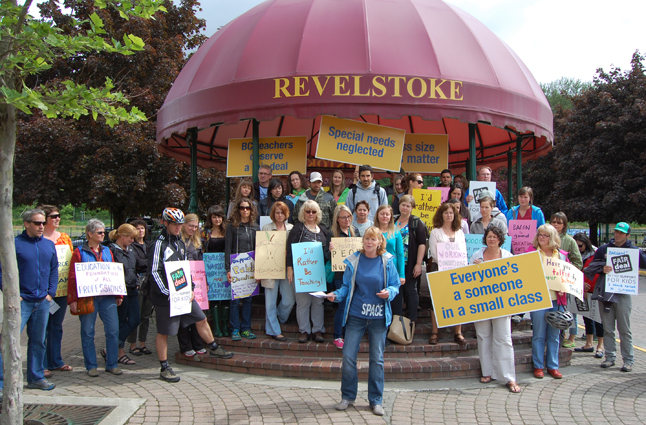
By David F. Rooney
Revelstoke teachers gathered at the Grizzly Plaza gazebo on Tuesday in a show of strength — and defiance — in the face of the government’s unwillingness to reach an agreement with their union.
Teachers gathered at the Community Centre on Monday morning to watch a news conference held by BC Teachers’ Federation (BCTF) president Jim Iker who criticized government negotiators for squandering an opportunity when both sides met on the weekend.
Iker said the BCTF brought a lower wage offer to the talks, cutting their salary demands to eight per cent over five years, but with a $5,000 signing bonus. That would have put them within one per cent of the original government offer, he said.
For its part the government returned with a reduced wage offer — from 7.25 per cent to seven per cent — with the original $1,200 signing offer, Iker said.
“What kind of negotiating tactic is that?” one teacher asked at the rally at Grizzly Plaza. (Please click here to view a statement at the rally by Revelstoke Teachers Association President Jennifer Wolney.)
Jennifer Wolney said teachers need much more support than they are getting.
“I’m hoping that parents and grandparents and aunts and uncles will support us in this fight,” she said, “because if they don;t support us the public education system will continue to deteriorate.”
The original government offer of 7.25 per cent included a 0.75 per cent reduction in benefits that was rejected by the BCTF.
The new offer of seven per cent does not involve any claw back in terms of benefits, so in effect is a 0.5 per cent increase on the original offer.
With regard to the critical class size and composition negotiations Iker said the government wants either side to be able to terminate the contract based on the outcome of its appeal to the Supreme Court. Teachers here in Revelstoke said no union leader in his or her right mind would sign an agreement containing such a clause.
The entire affair left a bad taste in the mouths of teachers. At the rally teachers Sarah Newton and Tracy Tompkins noted the irony of educators teaching students about the way Canadian democracy work and then watching the provincial government first ignore two BC Supreme Court decisions that went against it and, now, attempt to set up a situation that would allow it to weasel out of a legal contract if the highest court in the land finds against it.
Teachers are especially concerned about class size and composition. During the rally teacher Laurie Henshaw said previous contracts had stated that classes could have no more than three Independent Educational Plans (IEP) per class. IEP is a euphemism for students with significant learning challenges. However, she said that of 25 children in her class 12 are IEPs. That means that as a teacher she has to meet more often with parents and educational assistant and find ways to adapt the curriculum for those students, all of whom have different problems, or find ways to help them, such as scribing for them or finding someone to read to them.
Class size and composition are daunting issues and meaningful improvements to class size and composition “must” be part of any contract agreement, Iker said.
“Instead of flexibility, we saw stonewalling,” he told reporters at the news conference. “Instead of bargaining 24/7, the government sat on their hands for two days.”
The government did not respond in full to the offer made by teachers on Friday evening until Sunday night, said Iker.
“The government was unprepared, unwilling and unhelpful,” he said.
News reports from the Lower Mainland said Peter Cameron, chief negotiator for the B.C. Public School Employer Association (BCPSEA), claimed that the weekend involved delays on both sides, “characteristic of hard bargaining.”
What all this means, of course, is that the schools are now closed and teachers will be picketing instead of teaching.



